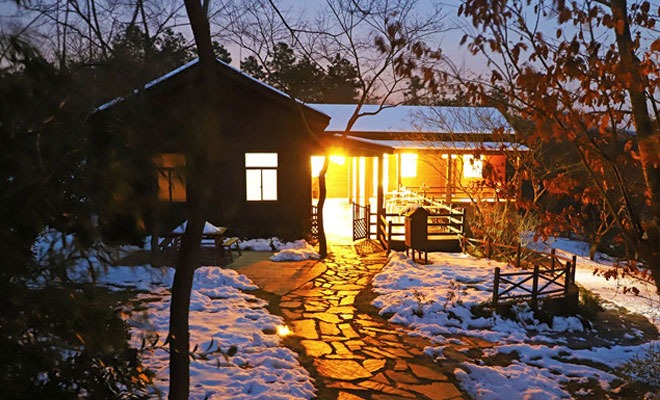Nanjing is this winter seeing its largest snowfall in a decade; schools and businesses have closed and state snowstorm warnings have been issued. While the snow is not predicted to last the entire winter, the temperature, it is said shall remain low. Meanwhile, the snow topped roofs of Nanjing and the tranquility of the city invokes thoughts of cozy fireplaces, wooly socks and woodland cabins.
With the recent spike in Nanjing countryside B&B bookings for Spring Festival this year, it seems many Nanjingers are having similar thoughts. The Double Fan Boutique Bed and Breakfast Village and The Cloud Shijian Cultural Exhibition Centre, both located Jiangning District, are expected to be full to more than 70 percent of capacity for the coming Spring Festival, far more than in previous years, it has been reported.
“The bed and breakfast concept has existed in one form or another for ages. Monasteries served as bed and breakfasts for travellers, and in some cases still do. Bed and breakfasts have been very popular with the traveling public in Europe for years. It was in England, Scotland, and Ireland that the term ‘bed and breakfast’ first came into use”, says Elenor Ames from Trip Savvy.
- Why the Younger Generation is Saying No to Chinese New Year
- Record Demand for Customised Chinese New Year Travel Plans
Whatever B&B culture existed after the cultural revolution in China presumably involved bleak accommodations at best and likely no breakfast; mainly serving up-and-coming businessmen, wheeling and dealing on the outer perimeters of emerging cities. Such un-registered, tax-free and somewhat unscrupulous accommodation not only housed businessmen from the early 80s onwards, but their not checking of IDs meant they also served as a haven for the underbelly of China’s rural communities.
Although, to a degree, this kind of B&B culture still exists these days, the emergence of wealth, government regulations within the tourism industry, an awareness of safety measures and a rising expectation of international standards, an English style B&B industry is beginning to boom. “It is urgent and necessary to form a nationwide applicable standard which is reasonable and effective, and establish a unified, national management standard of the homestay industry”, comments Associate Professor at Tongji University’s School of Law, Hu Jie.
“In recent years, as people’s living standards continue to improve, more and more people like traveling by car. At present, China’s B&B does not yet have a clear [government] department in charge, while the responsibilities between different departments are unclear… Related policies and regulations lag behind the fast-growing B&B [industry], making it difficult to effectively monitor and manage the entire industry”, Hu went on to say.
- Spring Festival Fatality Highlights Binge Drinking
- 440 Million Rail Journeys Expected During Chinese New Year 2020
That said, the industry, just as with everything else in China, is growing fast. One search for AirBnB shows 300+ results for B&B accommodation in Nanjing alone. Not only are bed and breakfasts, inns and villa housing rising in popularity, but the idea of “organic farm living”, in a country that for decades has suffered from pollutant problems, is also an upward trend. Organic farms in Pukou, Jiangning and Xianlin (spacious districts that surround downtown Nanjing) are all the rage. Visitors can now opt to enjoy an organically fed, clean and tranquil weekend away.
Among the very small amount of foreigners to have established B&Bs in China, are those who have opened their doors to the south. In Yunnan and neighbouring provinces, local “laowai” have attempted to break away from the more traditional “modern” hotel style and have created oases of ancient Chinese courtyards, featuring lush green gardens and cozily designed rooms. Being a blast from China’s past, they have not only attracted traveling foreigners, but have also helped pave a way for China’s legions of lost youths, with time and money to revel in the architectural splendour of their ancients.
According to the China National Tourism Administration report of 2016, tourist spending totalled $500bn in 2015 and was expected to double by 2020 to $1.2tn. Justin Bergman from the Guardian notes, “Most of this travel is happening domestically, too. According to the report, the number of trips taken inside China reached a remarkable 4.1bn in 2015, an average annual growth of 10.2 percent.”
In 2017, the Jiangning Tourism Industry Group got together to help promote the integration and development of touristic resources throughout the entire region, and to promote and upgrade the western region of Jiangning’s countryside.
The completion of the Huanglong Dian scenic area, the Twelve King’s Gui Mountain upgrade, beautiful night running facilities, roads, lighting, and green trees have been areas of concern. Along with the Longxiang Double Fan boutique Bed and Breakfast Village, the Xingxinglong Park, the Fan Zhuang pasture, the Linshui Sanju construction project and the Yunshui Jian Cultural Exhibition Centre, the construction of a total of 12 cultural boutique B&Bs, together with their surrounding environment renovation and landscape enhancement is under way. Jiangning B&Bs have been decorated as water-style bed and breakfasts, Chinese classical bed and breakfasts, as well as modern, minimalist-style bed and breakfasts.
Furthermore, according to Jin Zhenhuan of the Yangtze Evening Post, the Jiangning Tourism Industrial Group will this year start to analyse big data aggregation in order to better service the “five elements” of food, housing, tourism, shopping and entertainment, with hopes to constantly improve “beautiful rural tourism”.









